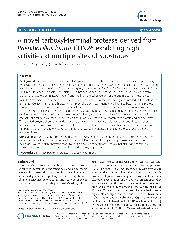摘要
Background: Carboxyl-terminal protease (CtpA) plays essential functions in posttranslational protein processing in prokaryotic and eukaryotic cells. To date, only a few bacterial ctpA genes have been characterized. Here we cloned and characterized a novel CtpA. The encoding gene, ctpAp (ctpA of Paenibacillus lautus), was derived from P. lautus CHN26, a Gram-positive bacterium isolated by functional screening. Recombinant protein was obtained from protein over-expression in Escherichia coli and the biochemical properties of the enzyme were investigated. Results: Screening of environmental sediment samples with a skim milk-containing medium led to the isolation of a P. lautus CHN26 strain that exhibited a high proteolytic activity. A gene encoding a carboxyl-terminal protease (ctpAp) was cloned from the isolate and characterized. The deduced mature protein contains 466 aa with a calculated molecular mass of 51.94 kDa, displaying 29-38% amino acid sequence identity to characterized bacterial CtpA enzymes. CtpAp contains an unusual catalytic dyad (Ser(309)-Lys(334)) and a PDZ substrate-binding motif, characteristic for carboxyl-terminal proteases. CtpAp was expressed as a recombinant protein and characterized. The purified enzyme showed an endopeptidase activity, which effectively cleaved a S1- and beta- casein substrates at carboxyl terminus as well as at multiple internal sites. Furthermore, CtpAp exhibited a high activity at room temperature and strong tolerance to conventional protease inhibitors, demonstrating that CtpAp is a novel endopeptidase. Conclusions: Our work on CtpA represents the first investigation of a member of Family II CtpA enzymes. The gene was derived from a newly isolated P. lautus CHN26 strain exhibiting a high protease activity in the skim milk assay. We have demonstrated that CtpAp is a novel endopeptidase with distinct cleavage specificities, showing a strong potential in biotechnology and industry applications.
- 出版日期2013-10-25
- 单位上海海洋大学
